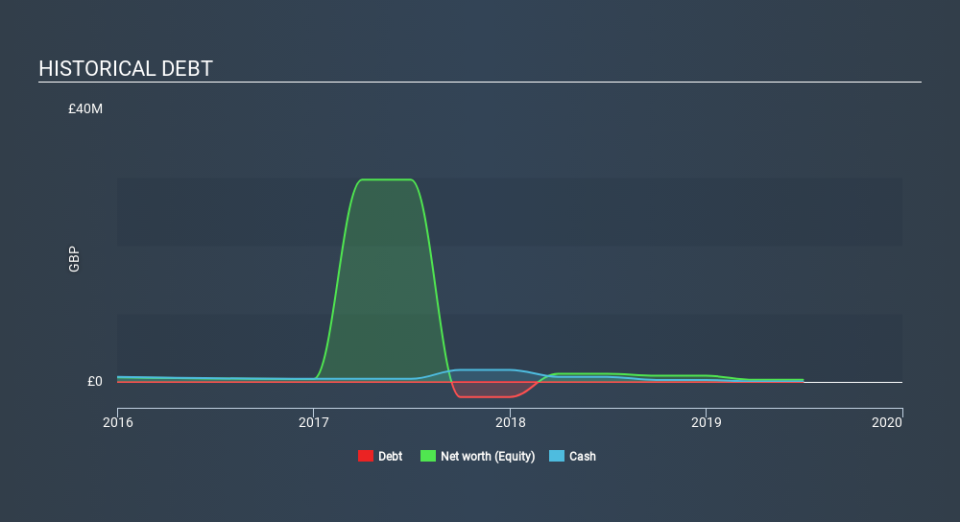If You Had Bought Sealand Capital Galaxy (LON:SCGL) Stock A Year Ago, You'd Be Sitting On A 86% Loss, Today

As every investor would know, you don't hit a homerun every time you swing. But it's not unreasonable to try to avoid truly shocking capital losses. We wouldn't blame Sealand Capital Galaxy Limited (LON:SCGL) shareholders if they were still in shock after the stock dropped like a lead balloon, down 86% in just one year. That'd be enough to make even the strongest stomachs churn. Sealand Capital Galaxy hasn't been listed for long, so although we're wary of recent listings that perform poorly, it may still prove itself with time. Shareholders have had an even rougher run lately, with the share price down 84% in the last 90 days.
We really feel for shareholders in this scenario. It's a good reminder of the importance of diversification, and it's worth keeping in mind there's more to life than money, anyway.
See our latest analysis for Sealand Capital Galaxy
Sealand Capital Galaxy recorded just UK£587,055 in revenue over the last twelve months, which isn't really enough for us to consider it to have a proven product. We can't help wondering why it's publicly listed so early in its journey. Are venture capitalists not interested? So it seems shareholders are too busy dreaming about the progress to come than dwelling on the current (lack of) revenue. It seems likely some shareholders believe that Sealand Capital Galaxy will significantly advance the business plan before too long.
Companies that lack both meaningful revenue and profits are usually considered high risk. There is usually a significant chance that they will need more money for business development, putting them at the mercy of capital markets. So the share price itself impacts the value of the shares (as it determines the cost of capital). While some such companies do very well over the long term, others become hyped up by promoters before eventually falling back down to earth, and going bankrupt (or being recapitalized). Sealand Capital Galaxy has already given some investors a taste of the bitter losses that high risk investing can cause.
Sealand Capital Galaxy had liabilities exceeding cash by UK£405k when it last reported in June 2019, according to our data. That puts it in the highest risk category, according to our analysis. But with the share price diving 86% in the last year , it's probably fair to say that some shareholders no longer believe the company will succeed. You can see in the image below, how Sealand Capital Galaxy's cash levels have changed over time (click to see the values). You can click on the image below to see (in greater detail) how Sealand Capital Galaxy's cash levels have changed over time.
Of course, the truth is that it is hard to value companies without much revenue or profit. Would it bother you if insiders were selling the stock? I would feel more nervous about the company if that were so. It only takes a moment for you to check whether we have identified any insider sales recently.
A Different Perspective
Given that the market gained 11% in the last year, Sealand Capital Galaxy shareholders might be miffed that they lost 86%. However, keep in mind that even the best stocks will sometimes underperform the market over a twelve month period. The share price decline has continued throughout the most recent three months, down 84%, suggesting an absence of enthusiasm from investors. Basically, most investors should be wary of buying into a poor-performing stock, unless the business itself has clearly improved. Shareholders might want to examine this detailed historical graph of past earnings, revenue and cash flow.
If you like to buy stocks alongside management, then you might just love this free list of companies. (Hint: insiders have been buying them).
Please note, the market returns quoted in this article reflect the market weighted average returns of stocks that currently trade on GB exchanges.
If you spot an error that warrants correction, please contact the editor at editorial-team@simplywallst.com. This article by Simply Wall St is general in nature. It does not constitute a recommendation to buy or sell any stock, and does not take account of your objectives, or your financial situation. Simply Wall St has no position in the stocks mentioned.
We aim to bring you long-term focused research analysis driven by fundamental data. Note that our analysis may not factor in the latest price-sensitive company announcements or qualitative material. Thank you for reading.

 Yahoo Finance
Yahoo Finance 
